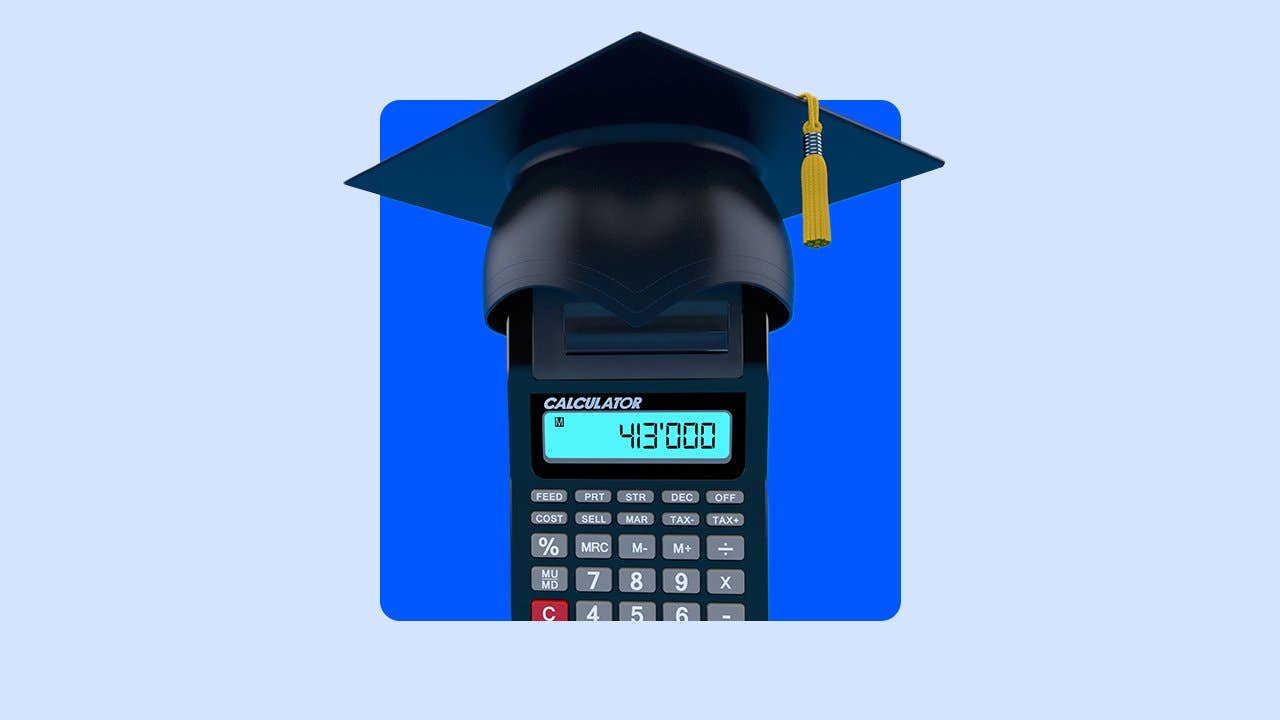How to calculate and pay less student loan interest

Key takeaways
- Comparing offers and rates can save you thousands over the life of the loan.
- Interest on student loans increases the total amount owed and can begin accruing immediately.
- Student loan interest may be tax-deductible, but the amount eligible for deduction varies.
Interest is the cost of borrowing money from a financial institution and increases the total amount you’ll pay back. It’s important to compare student loan rates to find one that ensures you’re able to make your monthly payment and keep the overall cost of the loan to a minimum.
Before you take out student loans to pay for the costs of higher education, make sure you understand the impact interest has on the money you borrow. Calculating your student loan interest ahead of time can help you build an effective budget and prepare for post-graduate monthly payments.
Calculating student loan interest
Your interest rate and how often you calculate it will depend on the types of student loans you have. From when the interest begins accruing to whether the rate can change, many of the differences between private and federal student loans are also the factors that affect loan rates.
3 Steps to calculating student loan interest
The process of calculating your student loan interest takes three steps:
- Find your daily interest rate: Divide the annual interest rate on your student loan by the number of days in a year (365).
- Determine your daily interest accrual charge: Multiply your daily interest rate by your outstanding loan balance, or principal balance.
- Calculate your monthly interest payment: Multiply your daily interest by the number of days in your billing cycle.

Calculate your student loan costs
Use this student loan calculator to find the rate and term that suit your budget and get an estimate of what your monthly payment will be.
Crunch the numbersCalculation example
Here’s what the steps look like in a real-world example. Let’s say you have a $10,000 loan with a six percent interest rate and a 10-year repayment term. You’re billed on a 30-day cycle.
- Daily interest rate = annual interest rate / number of days in a year = 0.06 / 365 = 0.000164, or about 0.016 percent in daily interest
- Daily interest accrual charge = (daily interest rate)(outstanding loan balance) = (0.000164)($10,000) = about $1.64 in daily interest
- Monthly interest payment = (daily interest)(number of days in a billing cycle) = ($1.64)(30) = about $49.20 in total monthly interest
How student loan amortization works
Amortization is the process of paying off a student loan and how each monthly payment is applied to the principal and interest. In the beginning of the repayment term, a larger portion of the loan goes toward the interest charged on the loan. As the borrower pays off more of the principal balance, less interest is charged, so a smaller portion of the payment goes toward paying interest.
3 Factors that affect student loan interest
Simple vs. compound interest
Student loans can have simple or compound interest, but most — including federal loans — are calculated using a simple interest formula. This formula essentially multiplies three factors:
- Your student loan’s daily interest rate
- Outstanding loan balance
- The number of days in your billing cycle
Though less common, some lenders charge compound interest. In other words, you’re charged interest on the principal along with any unpaid interest.
Fixed vs. variable interest rate
Federal student loans have a fixed interest rate, which stays the same throughout the life of the loan. Private loans can have fixed or variable rates, which may increase or decrease based on market conditions.
Subsidized vs. unsubsidized
If a student loan is subsidized, interest will not accrue on the loan while you’re in school. If the loan is unsubsidized, it will accrue interest while you’re in school. That means you could have a higher balance than what you borrowed even before you begin making full payments on the loan. While private student loans are generally unsubsidized, federal loans can be subsidized or unsubsidized.
3 Tips for paying less interest on student loans
There are a few strategies for paying less interest on student loans, whether by securing a lower interest rate from the beginning, changing your rate later or lowering your principal balance quicker.
Bottom line
If you are considering borrowing money for school, the next step is to shop around to find the best student loan for you. Comparing offers and rates is a crucial step before applying for a loan to ensure you get the best terms and interest rate.
You can use a student loan calculator to estimate how long it will take you to pay off your desired loan, calculate your student loan interest and get an estimated monthly payment amount so you can budget accordingly.
Frequently asked questions
Why we ask for feedback Your feedback helps us improve our content and services. It takes less than a minute to complete.
Your responses are anonymous and will only be used for improving our website.





